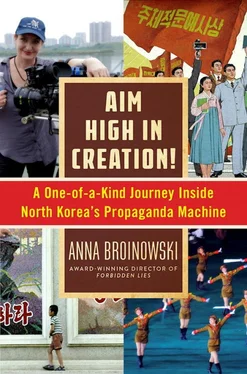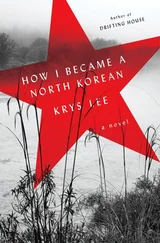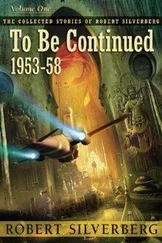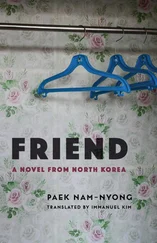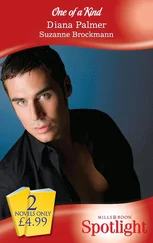Jang Hae Sun is a wiry old man with bright eyes and a ramrod posture. He sits on a brocade couch in his tiny flat, surrounded by bottles of pickled ginseng. The bottles range in size from pipettes to jugs as big as fire extinguishers. The twisted roots suspended inside look like alien foetuses. Behind Jang’s head is a magnificent tapestry of a Siberian tiger—which apparently still exists in the unspoilt wilds of the DMZ. Jang watches impatiently as I set up my lights. My interpreter, Monica, a high-flying Seoul commercials producer who has, for some mysterious reason, taken my low-paying gig, distracts Jang with chitchat about the storm clouds amassing outside.
Jang majored in philosophy at Kim Il Sung University and worked as a reporter for Chosun Central Broadcasting for twenty years. Before that, he was a bodyguard for Kim Il Sung. He fled North Korea in 1996, when he could no longer stand the deceptions of popular TV series like The Star of North Korea , which portrayed Kim Il Sung as a heroic saviour: “It is a complete lie. People do not know what happened in the ’20s and ’30s. People who know what’s true cannot say anything, so everyone believes Kim Il Sung was a respected hero. If anyone criticised this, they had to escape North Korea—like me.”
Jang is writing a book about North Korean defectors. He also has ties with a South Korean activist group which flies hot-air balloons over the border, delivering pamphlets to counter the propaganda North Koreans are fed about South Korean poverty, their own prosperity and the evils of the free world. Jang has a deep love for the people he’s left behind, but no respect for their Leaders. He was at university, a few years behind Kim Jong Il and remembers the Dear Leader as a lady-killer: “He was very popular among female students because, owing to his privileged status as the son of Kim Il Sung, he could record new movies and circulate them. He owned many rare films. He utterly neglected his academic work. His brother, Kim Pyong Il, did not mingle with students and was arrogant. We did not want to befriend either of them.”
Jang detests North Korean movies. “In North Korea, high-ranking officials commit bad things. But they are portrayed as the good guys. Kim Il Sung and his son are the worst ones, but they are depicted as the best people. Those who are loyal to Kim Il Sung and Kim Jong Il are shown receiving wealth and privileges. In reality, that doesn’t happen.” Despite this, Jang still carries a flame for socialism: “In capitalist countries, including South Korea, people only look after themselves. The main characteristic of North Korean movies is the sacrifice of the individual for the benefit of the masses—which seems a good idea to me. I think everyone should learn to sacrifice themselves for the group. Australians are no exception.” Jang shoots me a pointed look.
Encouraged, I tell him my film idea. I’m hoping he’ll appreciate its socialist undertones. But his eyes flash with disdain: “No one will watch it! The North Koreans won’t want to, but will be forced to. If it is shown in free countries like South Korea, who’s going to go? No one!” Jang lets out a mirthless laugh and sips his tea. The brutal honesty is something I’m beginning to recognise as a distinctly Korean trait, quite unlike the delicate half-truths I’ve learnt to use speaking Japanese. I ask Monica to explain the CSG issue to Jang, and why I have to make my film. He thinks carefully, then lights up: “Why don’t you make an animation? In South Korea animations are done on computer, but in North Korea they are manually drawn, by over a hundred people. If you can make a children’s story about good vs evil, with animal characters like a rabbit or fox, it might work. You can even do a co-production with North Korea!”
I nod politely, imagining my gardener heroine as a rabbit and the villainous miner as a fox, battling it out on a smart-board in my daughter’s grade four classroom. Not quite the demographic I want to reach. I hand Jang my copy of Kim’s manifesto, asking if he thinks its rules are sophisticated enough to work in the West. Jang slaps the book down on a ginseng bottle, annoyed: “Kim Jong Il believed he was a genius, but he didn’t have any talent. He was just an ordinary person who liked film. These are basic rules used by anyone producing a movie: the director is the most important person, music should be included and editing is crucial. They are important principles, but not because Kim Jong Il said so.”
Jang tugs at his lapel mic. Conversation over. I ask him feebly if he remembers any North Korean movie songs. Monica shoots me a warning look: I’m pushing it. But Jang leans forward, his autocratic face suddenly wreathed in a beautiful smile: “Yes. It’s called ‘Fourteenth Winter.’ It was very popular with the North Koreans.” He starts to sing, in a mournful vibrato: “Birds are flying away, searching for a warm nest out of the cold wind…”
Jang’s resonant voice floats over the rooftops, above the dull rumble of the coming storm.
WALKING INTO MR. C’S CLUTTERED REAL-ESTATE office, I’m feeling deflated. The only uplifting thing about Kim’s movies seems to be the songs. Clearly, my film will have to be a musical. For me, hell is a musical, full of tap-dancing and false cheer. It’s the most unbearable art form I know.
But Mr. C, a fastidious man with impeccable hair, surprises me. He thinks a Kim Jong Il–style drama about CSG will work: “It will be timely, since the environment is of crucial concern. Your theme is good. I have an inkling it will generate great success.” Monica and I look at each other, incredulous. I ask Mr. C if he thinks I’m crazy to want to follow Kim’s rules. “No, it makes sense. Kim Jong Il was a genius of art. Even though he is heavily criticised for his evilness, he is well versed in film. The contents of his book are worthy of consideration. I’m not critical of North Korean movies. There are many good ones, made under difficult conditions, with few resources.”
Mr. C did not have to leave North Korea. As a Party official, he was one of the privileged few. He moved into politics after ten years’ military service, becoming a provincial governor. He met Kim Jong Il at a few official functions and was not a fan: “I saw him twice, giving directions in a rude way. But North Koreans don’t know this, because the way he talks is manipulated before being broadcast. They only see him being polite. I have a different opinion about the two Kims. I put Kim Il Sung in a positive light. He fought to regain the country, and experienced a lot of hardship. But Kim Jung Il, simply on the grounds of being Kim Il Sung’s son, inherited power. It is not right that he let the people become poor. The bottom line is, he is a failed politician.”
Mr. C defected to Seoul in 2004. It’s not clear why. For five years, he ran a newspaper for defectors called The Settler , providing employment tips and news from home. He collected the news from secret contacts in North Korea, phoning them from Beijing. Now he sells real estate. If Mr. C hadn’t just criticised Kim Jong Il to my face, I’d wonder if he was a spy. Pyongyang regularly sends agents south to keep tabs on defectors. Then again, with the propaganda refocused on Kim Il Sung under his grandson’s new regime, maybe it is safe to slam Kim Jong Il now. Maybe Mr. C still is a spy: gathering data for Kim Jong Un and assessing potential threats to North Korea’s image—including, perhaps, my film. When I ask why he’s here, he is suspiciously vague: “At the early stage of my life in South Korea, I regretted my defection. I enjoyed a good life in the North. But I finally concluded I made the right choice—because of freedom, and the discrepancy of North Korean society.”
Читать дальше
